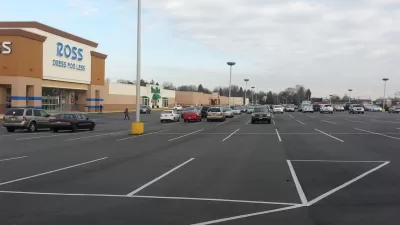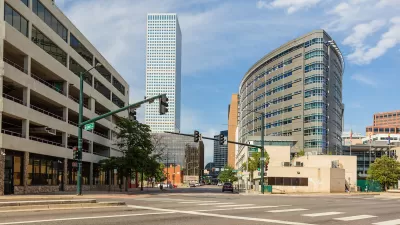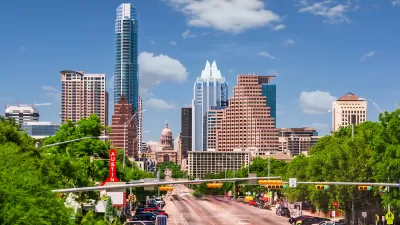Despite mounting evidence that parking requirements subsidize cars, raise the cost of housing, and contribute to greenhouse gas emissions, few policymakers have strongly advocated to end them.

While housing advocates praise Alexandria Ocasio-Cortez's move to call on city council candidates seeking her endorsement to fight to end single-family zoning, Nicole A. Murray calls on progressives like AOC to also address another component of zoning code that has far-reaching effects on housing affordability, density, and transit use: minimum parking requirements.
Originally pushed by the likes of The American Auto Association and Automotive Safety Foundation (which is associated with “automotive and allied industries“) to accommodate the influx cars in the post-war years, the parking requirements enshrined in the zoning law that has guided city policy since 1961 have mandated residential and commercial storage space for thousands of vehicles, regardless of proximity to (current or future) transit, the transportation needs and demographics of residents, or even local air quality or traffic-safety statistics.
Murray provides a list of reasons why mandatory parking requirements undermine affordable housing and public transit use. These include the high cost of building parking spots(which gets added on to the cost of housing units), the massive amount of space required for parking, and the added congestion that free parking encourages. They also raise costs for renters and carless transit users who don't benefit from parking. As Murray puts it, "Robert Moses couldn’t dream up a better deal to keep mass motoring alive." If Progressives want to make cities more livable and equitable, Murray argues, addressing parking regulations is an essential step.
FULL STORY: OPINION: Progressives Should Look To Outlaw Parking Minimums

Manufactured Crisis: Losing the Nation’s Largest Source of Unsubsidized Affordable Housing
Manufactured housing communities have long been an affordable housing option for millions of people living in the U.S., but that affordability is disappearing rapidly. How did we get here?

Americans May Be Stuck — But Why?
Americans are moving a lot less than they once did, and that is a problem. While Yoni Applebaum, in his highly-publicized article Stuck, gets the reasons badly wrong, it's still important to ask: why are we moving so much less than before?

Using Old Oil and Gas Wells for Green Energy Storage
Penn State researchers have found that repurposing abandoned oil and gas wells for geothermal-assisted compressed-air energy storage can boost efficiency, reduce environmental risks, and support clean energy and job transitions.

Minneapolis Bans Rent-Setting Software
Four cities have enacted restrictions on algorithmic software that can inflate rent costs.

Oakland to Add 244 New EV Chargers
Oakland plans to launch its new charging network at eight locations by the end of 2025.

Jane Goodall Inspires with Message of Hope, Resilience, and Environmental Action
Speaking in Pasadena, Jane Goodall offered a hopeful and inspirational message, urging global compassion, environmental responsibility, and the power of individual action to shape a better future.
Urban Design for Planners 1: Software Tools
This six-course series explores essential urban design concepts using open source software and equips planners with the tools they need to participate fully in the urban design process.
Planning for Universal Design
Learn the tools for implementing Universal Design in planning regulations.
Heyer Gruel & Associates PA
City of Moreno Valley
Institute for Housing and Urban Development Studies (IHS)
City of Grandview
Harvard GSD Executive Education
Salt Lake City
NYU Wagner Graduate School of Public Service
City of Cambridge, Maryland





























